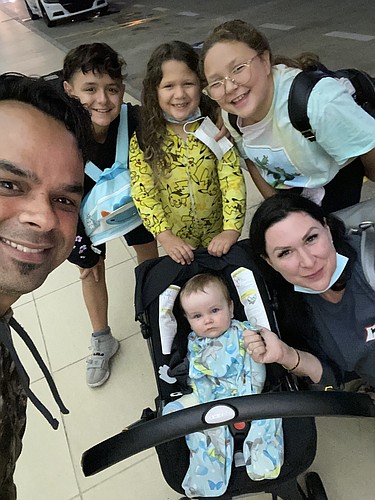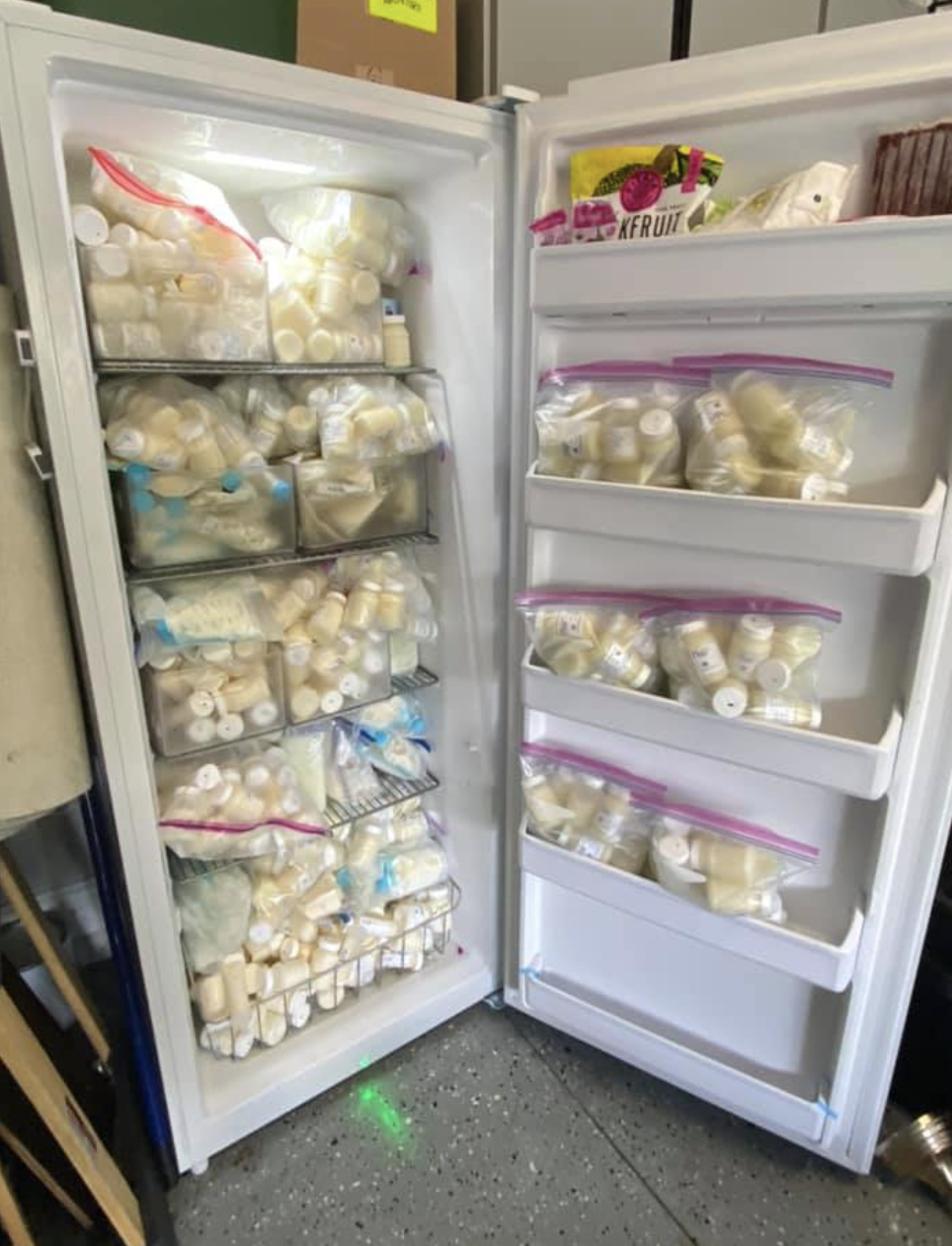- February 20, 2026
-
-
Loading

Loading

When Obie and Erica Diaz brought home baby Oliver, their plan was to breastfeed him until he was 6 months old. When he reached that age, they wanted to continue until he was 1.
There was one problem, though; Oliver was adopted, so Erica Diaz wasn’t producing breastmilk of her own. She had been relying on donor milk, and the mother who had been supplying the milk was producing less now that her baby was getting older.
Erica Diaz purchased a can of formula — just in case — but the Diazes are grateful to the “true angel” who came into their lives a month ago and offered 2,500 ounces of breastmilk for their 8-month-old son.
The mother, Katie Barrett, was a Godsend to the Diazes. Barrett’s son was born with spina bifida, and she had been pumping for him in the hospital NICU. The hospital wouldn’t allow her to donate her milk from there, so she was pumping it, taking it home and storing it in her freezer.
It was more than her premature son could ever drink.
After connecting with Barrett, Erica Diaz picked up the carload of frozen milk and took it home. She and her husband had to give her parents food from two refrigerators and a deep freezer just to store all of the donated breastmilk.
“The really cool thing is that will get him through to his first year,” Erica Diaz said. “And he’s on solids, so we’re feeding him like 20 ounces now.”
She has always trusted her gut, she said, when accepting donated breastmilk, and she has only received one batch that was bad.
“I haven’t gotten that feeling on any other donations,” she said. “I trusted that he was grown somewhere else, and I figured if she’s feeding her child the breastmilk, then it’s safe for my child,” she said.
All of the breastmilk the Diazes have received has been free, so they repay their donors in other ways, such as giving premade meal packages, pump bags and spa gift cards. When Barrett refused money for the 2,500 ounces, the Diazes made a donation to a GoFundMe page that was set up to help pay Barnett’s son’s medical bills.
“Our donors have become friends so one day, when COVID isn’t a thing, we can get the babies together,” Erica Diaz said.
BABY OLIVER
When Erica and Obie Diaz were adopting their newborn son, they made the decision to feed him breastmilk to give him the best chance of growing up healthy. His being born during a pandemic solidified their decision.

“Adoption is trauma,” Erica Diaz said. “That notion that this is a healthy mother giving up her baby for adoption is a fairy tale.
“He came home when he was 6 days old,” she said. “He was 9.5 pounds. He was healthy, and we just fell immediately in love with him. We knew we wanted to do better for him, in whatever capacity that meant. We had taken him from one place to another, and there is trauma in that.”
The Diazes were connected with lactation consultants Brianne Griffis and Alex Ryan, who, in turn, paired the parents up with Danielle Varela, an overproducer who was interested in donated her milk to one person instead of selling it.
When Varela’s milk production slowed down, the Diazes began accepting small donations from several sources in an effort to continue breastfeeding their son.
Obie and Erica Diaz have three other children. She is a Winter Garden Realtor, and he is on the morning show at radio station K-92FM.
“It’s been incredible; they’ve been so selfless,” Erica Diaz said of the donors. “I know I pumped and I nursed, and I know there’s no way I could be as selfless as these women. I wouldn’t have had the energy.
“They’re really like guardian angels for him. There have been a lot of people who have been.”
LACTATION MOTIVATION
When Erica Diaz had questions, one of the people she called on was Brianne Griffis, a lactation provider in Winter Garden.
“A lot of moms ask, when should I call for lactation help, and I think the biggest thing is, it never hurts,” Griffis said. “If there’s an issue, we can turn it around quickly.”
In her position, Griffis meets with mothers at the hospital or their home and spends about an hour with them to find out their goals.
“It’s her feeding journey,” she said. “I can come in and tell her all these recommendations, but if that’s not going to fit her lifestyle, then it’s not going to help her.”
Griffis also addresses any issues, such as clogged pores or latching issues.
Her job is to share the benefits of breastmilk and breastfeeding.
“The benefits of breastmilk are passing the antibodies … the mom has passed through the breastmilk,” she said. “Antibodies cannot be added to breastmilk. Those are going to come directly from the mom
“From there, it’s going to have all the exact things that baby needs,” she said. “Over the years formula companies have tried to replicate that … to try to get it down as close to science as possible. But with breastmilk, you’re going to get exactly what you need for your baby.”
According to the Cleveland Clinic, breastfed babies have stronger immune systems, less diarrhea and constipation, fewer colds and respiratory illnesses, fewer ear infections, better vision, and less overall illness.
Breastfed babies tend to become healthier children with fewer instances of allergies and asthma, fewer childhood cancers, a lower risk of type I and II diabetes, fewer cavities and improved brain maturation, according to the Cleveland Clinic.
Breastfeeding also reduces the risk of breast and ovarian cancer, Griffis said. It also can help with postpartum depression, she said.
“With nursing, you’re getting skin-to-skin, and (this) signals to the brain oxytocin, the happy hormone,” Griffis said. “For moms, having the baby close while breastfeeding or pumping, it’s going to help with postpartum. (It) gives bonding for the mom and baby … and you’re releasing all those hormones so that mom can have the best postpartum journey possible.”
Determining how long to breastfeed a child depends on the parents. The American Academy of Pediatrics recommends exclusively breastfeeding for the first six months, and after that, starting solids, continuing to breastfeed for up to one year. The World Health Organization recommends up to two years.
Griffis said body builders and cancer patients have touted the benefits of breastmilk, and there are Facebook pages dedicated to selling breastmilk for its protein and healing properties.
Griffis prefers the role of connecting mothers.
“As a provider, it just brings me so much joy — working with Erica wanting to give Oliver 100% breastmilk and talking to Katie at all hours of the night wanting to keep pumping and provide for Erica,” Griffis said. “Even though it was just a phone call for me, it was nice to see that both moms got to help provide for Oliver.”
Griffis is available for mothers who have questions about breastfeeding. She can be reached at (407) 401-4404 or [email protected].